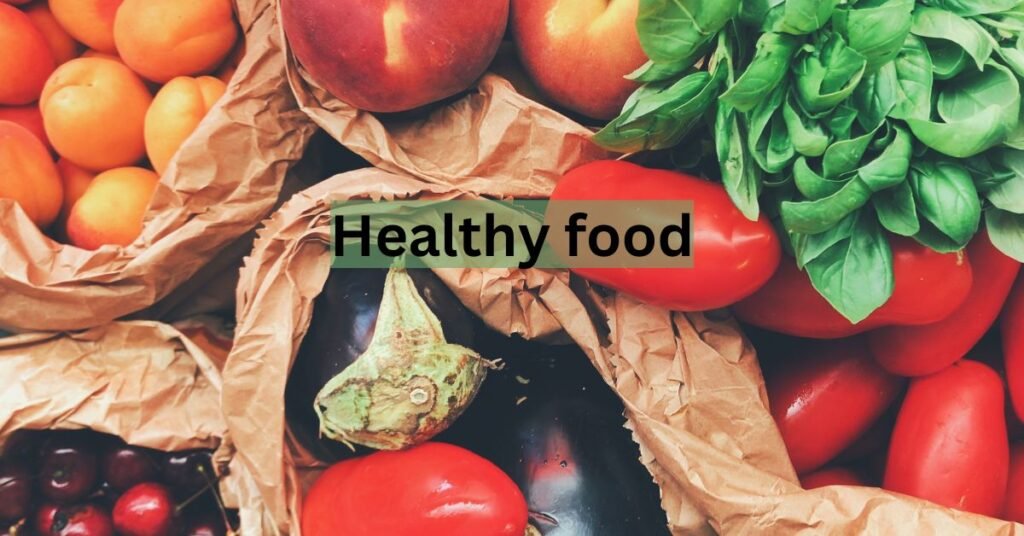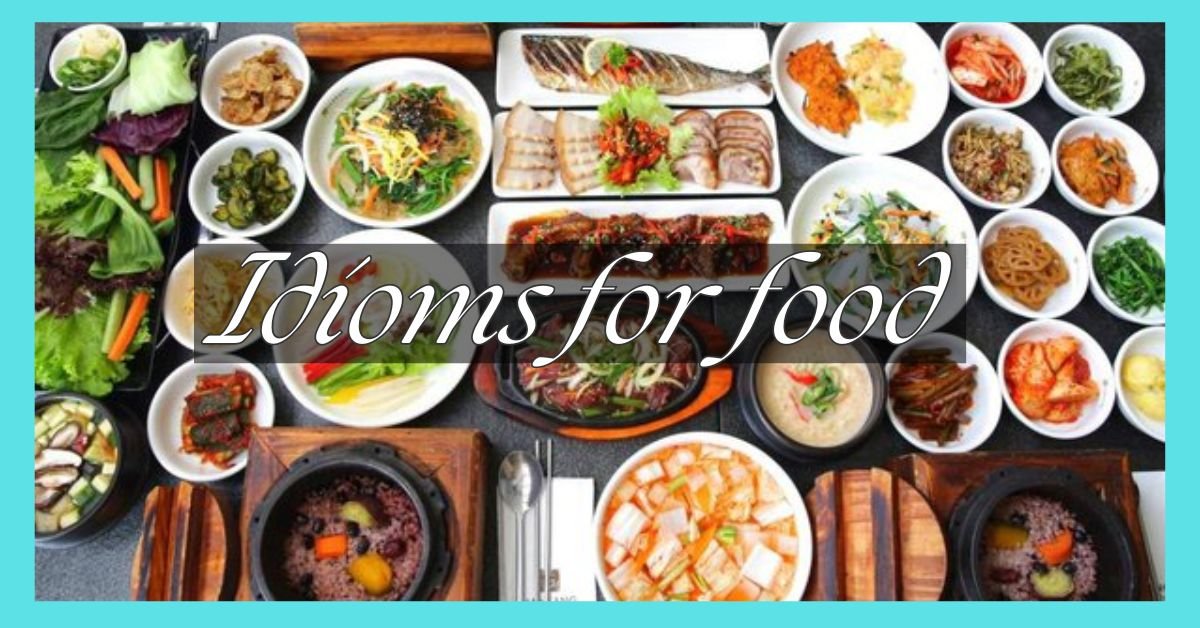Idioms for food
Welcome to the post “Idioms for food”. The English language is a treasure trove of creative ways to express ourselves, and food idioms are a delightful dish on the menu! These colorful expressions go beyond the literal meaning of ingredients, adding flavor and vivid imagery to your communication. Imagine describing someone difficult as a “hard nut to crack” or a simple task as “a piece of cake.”
“Idioms for food” offers a fun and engaging way to enhance your vocabulary and add personality to your conversations. This guide will explore 30 mouthwatering idioms for food, explaining their meanings, providing example sentences, and highlighting the ideal situations to use them. So, get ready to devour a delicious feast of language and become a master chef of expression with “Idioms for food”!

1. A Piece of Cake (Something Easy)
-
Meaning: This idiom describes something that is simple, effortless, or straightforward to complete.
-
Example Sentence: “Acing that exam was a piece of cake after all the studying I did.”
-
Use it When: You want to express that something is easy or requires minimal effort.
2. Hold Your Horses (Wait or Be Patient)
-
Meaning: This idiom advises someone to slow down, be patient, or avoid rushing into something.
-
Example Sentence: “Hold your horses! Let’s review all the options before making a decision.”
-
Use it When: You want to encourage someone to slow down, take a breath, and consider things carefully.
3. Chew the Fat (Have a Casual Conversation)
-
Meaning: This idiom describes a relaxed and informal conversation, often about unimportant things.
-
Example Sentence: “We spent the evening chewing the fat and catching up on each other’s lives.”
-
Use it When: You want to describe a casual and friendly conversation about everyday topics.
4. When Pigs Fly (Something Impossible or Highly Unlikely)
-
Meaning: This idiom describes something that is extremely improbable or never going to happen.
-
Example Sentence: “You’ll get me to eat broccoli when pigs fly!”
-
Use it When: You want to express that something is highly unlikely or practically impossible.

5. A Bad Egg (A Troublemaker or Untrustworthy Person)
-
Meaning: This idiom describes someone who is disruptive, causes problems, or cannot be relied upon.
-
Example Sentence: “Be careful not to trust him; he’s a bad egg and will only get you into trouble.”
-
Use it When: You want to warn someone about someone else’s negative behavior or untrustworthy nature.
6. Spill the Beans (Reveal a Secret)
-
Meaning: This idiom describes accidentally or intentionally revealing a secret or confidential information.
-
Example Sentence: “I accidentally spilled the beans about the surprise party to my friend.”
-
Use it When: You want to express that a secret has been revealed, either accidentally or on purpose.
7. On a Tight Budget (Limited Financial Resources)
-
Meaning: This idiom describes a situation where you have limited money to spend and need to be careful with your finances.
-
Example Sentence: “We’re on a tight budget this month, so we’ll have to skip eating out.”
-
Use it When: You want to express that you have limited financial resources and need to be frugal.

8. Hard Nut to Crack (A Difficult Problem or Person)
-
Meaning: This idiom describes a problem that is challenging to solve or a person who is difficult to understand or deal with.
-
Example Sentence: “Negotiating with that client is always a hard nut to crack.”
-
Use it When: You want to emphasize the difficulty of solving a problem or interacting with a challenging person.
9. Butter Someone Up (Flatter Someone)
-
Meaning: This idiom describes showering someone with compliments or praise in an attempt to gain their favor.
-
Example Sentence: “He was buttering up the boss in hopes of getting a promotion.”
-
Use it When: You want to express that someone is using excessive flattery to influence another person. (Note: This can be seen as insincere, so use it with caution.)
10. Full of Hot Air (Talking a Lot Without Substance)
-
Meaning: This idiom describes someone who talks excessively but offers little valuable information or ideas.
-
Example Sentence: “The politician was full of hot air during his speech, making empty promises.”
-
Use it When: You want to describe someone who talks a lot but says little of importance.

11. Have a Big Appetite (Be Eager or Ambitious)
-
Meaning: This idiom describes someone who has a strong desire for something, such as success, knowledge, or experience.
-
Example Sentence: “She has a big appetite for learning and is always taking on new challenges.”
-
Use it When: You want to express someone’s strong desire or ambition for something.
12. Don’t Bite the Hand that Feeds You (Don’t Be Ungrateful to Someone Who Helps You)
-
Meaning: This idiom advises someone not to harm or disrespect the person or source that provides them with help or support.
-
Example Sentence: “Don’t bite the hand that feeds you! Your boss gave you this opportunity, so be respectful.”
-
Use it When: You want to warn someone against being ungrateful or disrespectful to someone who helps them.
13. When the Chips Are Down (In a Difficult Situation)
-
Meaning: This idiom describes a challenging or stressful situation where things are not going well.
-
Example Sentence: “We’ll stick together when the chips are down, no matter what difficulties we face.”
-
Use it When: You want to express that you’re facing a difficult situation and need to persevere.
14. Rotten Egg (Something Unpleasant or Unsuccessful)
-
Meaning: This idiom describes something that is of poor quality, unpleasant, or a complete failure.
-
**The movie was a rotten egg and received terrible reviews.”
-
Use it When: You want to express strong dislike for something or emphasize its failure.

15. A Hard Pill to Swallow (Something Difficult to Accept)
-
Meaning: This idiom describes something unpleasant or difficult to accept, like a harsh truth or bad news.
-
**Losing his job was a hard pill to swallow, but he eventually moved on.”
-
Use it When: You want to express that something is difficult to accept or acknowledge.
16. Not My Cup of Tea (Not My Preference or Liking)
-
Meaning: This idiom describes something that doesn’t suit your taste or preference.
-
**While I love action movies, horror films are not my cup of tea.”
-
Use it When: You want to politely express that you don’t like something or find it uninteresting.
17. Easy as Pie (Very Simple or Effortless)
-
Meaning: This idiom, similar to “a piece of cake” (see #1), describes something that is straightforward and requires minimal effort.
-
Example Sentence: “Following these instructions will make cooking this recipe easy as pie.”
-
Use it When: You want to express that something is very simple or requires little skill to complete.
18. Get Cold Feet (Become Hesitant or Nervous)
-
Meaning: This idiom describes someone who loses their courage or enthusiasm about something, often at the last minute.
-
Example Sentence: “She almost got cold feet before her wedding but ultimately went through with it.”
-
Use it When: You want to express that someone is experiencing hesitation or nervousness before an important event.
19. Big Fish in a Small Pond (Someone Important in a Limited Sphere)
-
Meaning: This idiom describes someone who is considered significant or influential within a small group or limited area.
-
**He may be a big fish in his small town, but he’s unknown on the national stage.”
-
Use it When: You want to express that someone’s importance is relative to their limited environment.
20. Have egg on Your Face (Be Embarrassed or Humiliated)
-
Meaning: This idiom describes feeling ashamed or embarrassed after making a mistake or having a plan backfire.
-
**He had egg on his face after forgetting his boss’s birthday.”
-
Use it When: You want to express that someone is feeling embarrassed or humiliated due to a mistake.

21. Go Bananas (Go Crazy or Lose Control)
-
Meaning: This idiom describes someone behaving wildly, erratically, or losing their composure.
-
**The fans went bananas when their team scored the winning goal.”
-
Use it When: You want to express that someone is acting very excitedly or uncontrollably. (Note: This idiom can be considered informal.)
22. Fish Out of Water (Feel Uncomfortable or Out of Place)
-
Meaning: This idiom describes someone who feels awkward or uncomfortable in a situation they’re not familiar with.
-
**He felt like a fish out of water at the formal gala, surrounded by strangers.”
-
Use it When: You want to express that someone feels uncomfortable or awkward in a particular setting.
23. Whole New Ball Game (A Completely Different Situation)
-
Meaning: This idiom describes a situation that is significantly different from what came before, requiring a new approach.
-
**With the arrival of the new CEO, managing the company became a whole new ball game.”
-
Use it When: You want to emphasize a dramatic shift in a situation, requiring a different strategy.
24. Cost an Arm and a Leg (Be Extremely Expensive)
-
Meaning: This idiom describes something that is very expensive and requires a significant financial sacrifice.
-
**That new car costs an arm and a leg; maybe we should consider a more affordable option.”
-
Use it When: You want to express that something is extremely pricey.
25. The Cream of the Crop (The Very Best)
-
Meaning: This idiom describes the absolute best or most outstanding people or things in a particular category.
-
**Only the cream of the crop athletes qualify for the national competition.”
-
Use it When: You want to identify the absolute best or most exceptional examples of something.
26. Hard to Swallow (Difficult to Believe or Accept)
-
Meaning: This idiom is similar to “a hard pill to swallow” (see #15), describing something difficult to accept or believe, often due to its unpleasant nature.
-
**The news report about the corruption scandal was hard to swallow.”
-
Use it When: You want to express that something is difficult to accept or comprehend due to its negativity.

27. Feeling Peachey (Feeling Great)
-
Meaning: This lighthearted idiom describes feeling fantastic, healthy, and happy.
-
Example Sentence: “I woke up feeling peachy after a good night’s sleep and a delicious breakfast.”
-
Use it When: You want to express that you’re feeling excellent in a casual setting.
28.Spill the Tea (Reveal Gossip or Secrets)
-
Meaning: This idiom, with a modern twist on “spill the beans” (see #6), describes sharing juicy gossip or confidential information.
-
Example Sentence: “Come on, spill the tea! What really happened at the party last night?”
-
Use it When: You want to encourage someone to share gossip or interesting details in a casual conversation. (Note: Be mindful of the context and avoid spreading rumors.)
29. Butter My Biscuit (Express Pleasure or Surprise)
-
Meaning: This idiom, a southern colloquialism, is a more playful alternative to “butter someone up” (see #9). It expresses delight or surprise at something positive.
-
Example Sentence: “Winning the lottery would sure butter my biscuit!”
-
Use it When: You want to express strong amusement, pleasure, or surprise in a casual setting. (Note: This idiom is mainly used in spoken English, particularly in certain regions.)
30. Bananas for Something (Be Very Enthusiastic About Something)
-
Meaning: This idiom is a more informal version of “go bananas” (see #21). It describes being extremely excited or passionate about something.
-
**I’m bananas for this new band; their music is incredible!”
-
Use it When: You want to express strong enthusiasm or excitement about something in a casual conversation.

Conclusion
Food idioms are the secret ingredients to spicing up your English conversations! From the simple “piece of cake” to the colorful “go bananas,” these expressions add a layer of flavor and imagery that makes your communication more engaging and memorable. Throughout this exploration of “Idioms for Food,” we’ve devoured 30 delicious expressions for food, each with its unique meaning and context.
Now, armed with this tasty knowledge, you can confidently navigate any situation, from expressing frustration with a “hard nut to crack” to celebrating success with the “cream of the crop.” So, the next time you find yourself lost for words, remember these “Idioms for Food” and watch your conversations become as delightful and satisfying as a perfectly balanced meal!
I hope you enjoyed the post Idioms for food. In this post, delicious foods and their taste-related idioms are discussed. I have also written posts on Idioms for emotions, Idioms for jobs, Idioms for business, Idioms for relationships, Idioms for love, Idioms for fun, Idioms for education, Idioms for health, and Idioms for colors. You can just click and read these posts in detail.










Thanks for another fantastic post. Where else could anybody get that type of info in such a perfect way of writing? I have a presentation next week, and I am on the look for such information.
I gotta bookmark this internet site it seems very beneficial very beneficial
Thank you for another fantastic post. Where else could anyone get that kind of info in such a perfect way of writing? I have a presentation next week, and I’m on the look for such information.
I am not sure where you are getting your info, but great topic. I needs to spend some time learning much more or understanding more. Thanks for excellent info I was looking for this info for my mission.
Thanks for enabling me to gain new thoughts about desktops. I also have the belief that certain of the best ways to maintain your laptop in perfect condition is a hard plastic case, and also shell, which fits over the top of your computer. These types of protective gear are model targeted since they are made to fit perfectly within the natural outer shell. You can buy all of them directly from owner, or through third party places if they are readily available for your laptop computer, however its not all laptop will have a spend on the market. Once again, thanks for your guidelines.
I’m still learning from you, while I’m trying to achieve my goals. I absolutely liked reading everything that is posted on your site.Keep the tips coming. I enjoyed it!
Generally I do not read post on blogs, but I would like to say that this write-up very forced me to try and do so! Your writing style has been amazed me. Thanks, very nice post.
I would like to thnkx for the efforts you’ve put in writing this site. I’m hoping the same high-grade web site post from you in the upcoming also. In fact your creative writing skills has inspired me to get my own web site now. Really the blogging is spreading its wings rapidly. Your write up is a good example of it.
I as well as my buddies ended up reviewing the nice tactics on your site while quickly developed an awful feeling I had not expressed respect to the website owner for them. My young boys ended up passionate to study all of them and now have in fact been enjoying them. I appreciate you for turning out to be very accommodating and also for making a decision on this form of really good resources millions of individuals are really desperate to discover. My personal honest apologies for not expressing appreciation to you sooner.
I truly appreciate this post. I have been looking all over for this! Thank goodness I found it on Bing. You’ve made my day! Thanks again
hello!,I really like your writing so a lot! percentage we communicate more about your article on AOL? I need a specialist in this house to resolve my problem. May be that is you! Looking ahead to peer you.
Simply want to say your article is as astonishing. The clearness in your post is simply spectacular and i could assume you are an expert on this subject. Fine with your permission let me to grab your RSS feed to keep updated with forthcoming post. Thanks a million and please continue the rewarding work.
I think other website proprietors should take this web site as an model, very clean and wonderful user genial style and design, let alone the content. You’re an expert in this topic!
very nice submit, i definitely love this website, carry on it
Wow, superb blog format! How long have you been blogging for? you made running a blog look easy. The total glance of your website is excellent, as neatly as the content material!
As a Newbie, I am always searching online for articles that can be of assistance to me. Thank you
Howdy! Do you know if they make any plugins to safeguard against hackers? I’m kinda paranoid about losing everything I’ve worked hard on. Any recommendations?
You are a very intelligent individual!
I saw a lot of website but I believe this one has got something extra in it in it
I wanted to draft you that very small note to help thank you as before on your breathtaking techniques you’ve shared on this website. It has been certainly generous of you to provide unreservedly what a number of people would have sold for an e-book to make some money for themselves, chiefly considering the fact that you might have done it in case you desired. The things as well served to become a fantastic way to know that other individuals have a similar eagerness just as my own to understand good deal more when considering this problem. I know there are many more pleasant moments up front for folks who browse through your website.
Amazing content for learners.
Write more, thats all I have to say. Literally, it seems as though you relied on the video to make your point. You definitely know what youre talking about, why waste your intelligence on just posting videos to your weblog when you could be giving us something informative to read?
Sweet blog! I found it while surfing around on Yahoo News. Do you have any tips on how to get listed in Yahoo News? I’ve been trying for a while but I never seem to get there! Many thanks